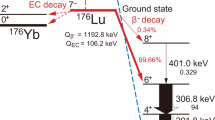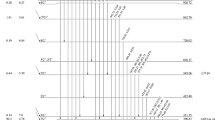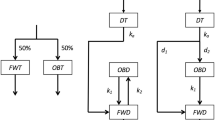Abstract
THE work of Aston has shown that potassium, which has an atomic weight of 39·104 (Hönigschmid), is a mixture of two isotopes. The atomic masses of these are 39 and 41, and they are present in ordinary potassium in the proportion of 20 to 1 respectively. Potassium emits a fairly penetrating β-radiation, and we are led to inquire as to which of the isotopes iS responsible for the emission of β-rays. It may be that there is a third isotope present in potassium, but in such small amounts that its detection by the mass spectograph is impracticable. Such a possibility has been discussed by Harkins (Proc. Nat. Acad. Sci., vol. 11, p. 630; 1925), who considers that isotopes of mass 40 or 41, the former of which is unknown, are the ones most likely toe radioactive. Harkins considers the hypothetical isotope of mass 43 (Kossel: Phys. Zeit., vol. 20; 1919) to be less probable.
This is a preview of subscription content, access via your institution
Access options
Subscribe to this journal
Receive 51 print issues and online access
$199.00 per year
only $3.90 per issue
Buy this article
- Purchase on Springer Link
- Instant access to full article PDF
Prices may be subject to local taxes which are calculated during checkout
Similar content being viewed by others
Author information
Authors and Affiliations
Rights and permissions
About this article
Cite this article
HEVESY, G. The Radioactivity of Potassium. Nature 120, 838–839 (1927). https://doi.org/10.1038/120838a0
Issue Date:
DOI: https://doi.org/10.1038/120838a0
This article is cited by
-
George Hevesy
Journal of Radioanalytical and Nuclear Chemistry (2007)
-
Gli elementi debolmente radioattivi
Il Nuovo Cimento (1940)
-
Einige Bemerkungen �ber isobare Elemente
Die Naturwissenschaften (1929)
Comments
By submitting a comment you agree to abide by our Terms and Community Guidelines. If you find something abusive or that does not comply with our terms or guidelines please flag it as inappropriate.



